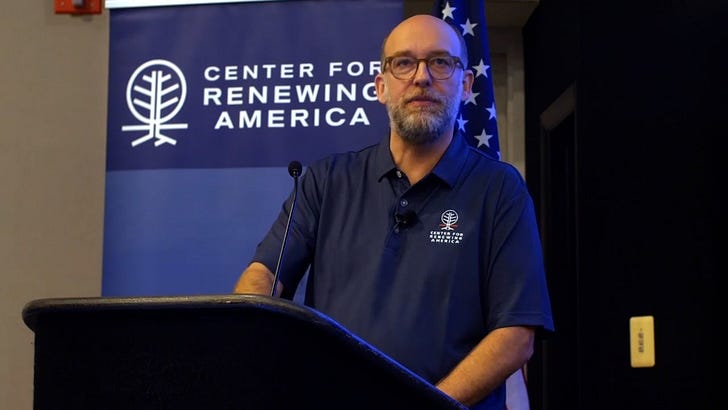Woe to those who make unjust laws,
to those who issue oppressive decrees,
to deprive the poor of their rights
and withhold justice from the oppressed of my people,
making widows their prey
and robbing the fatherless.
- Isaiah 10:1-2
Empathy is something I’ve always understood to be a virtue. It’s not the highest good, and an emphasis on only empathy, or selective application of empathy, could have ill effects. For example: if your empathy for the poor in another country leads you to neglect your own family, or a defending army is led by leaders who empathize too much with their enemies to be effective at protecting their fellow citizens. But in general, a world in which more people practiced empathy would likely be a more just, peaceful and happy place.
Surprising it is, then, that some on the Christian right have taken to calling it a sin, most recently in response to an Episcopalian Bishop asking Donald Trump to have mercy on LGBTQ people and immigrants. Here’s a particularly appalling example:
Ben Garrett is a pastor, and his reference to “the sin of empathy” echoes an article (in the style of C.S. Lewis’s Screwtape Letters) by Joe Rigney which argues that empathy is in conflict with compassion. The basic point is that empathy involves a person taking on the feelings of a sufferer and in so doing they become immersed in their situation, ultimately enabling and extending it. Compassion, Rigney says, maintains enough distance to see what is truly in that person’s best interest even if it might cause them pain in the short term.
Fair enough, I guess, though the idea that these are in conflict strikes me as obviously wrong. Empathy by itself may not be very constructive, but as a motivation to exercise compassion and act for the good of another, it is at the very least complementary. And whereas compassion alone can lead to paternalistic forms of charity, empathy keeps one humble. Jesus coming to earth was arguably the ultimate example of an empathetic act - he literally became human so he could experience what we experience. Pretty bold to call that a sin.
But honestly, I think this whole distinction is an intentional distraction. Bishop Budde didn’t even call for empathy specifically, but mercy and compassion on the vulnerable, especially immigrants and their children. She said:
"I ask you to have mercy, Mr. President, on those in our communities whose children fear that their parents will be taken away. And that you help those who are fleeing war zones and persecution in their own lands to find compassion and welcome here. Our God teaches us that we are to be merciful to the stranger, for we were all once strangers in this land."
I don’t know about you, but this sounds very biblical to me:
“The foreigner who resides among you must be treated as your native-born. Love them as yourself, for you were foreigners in Egypt. I am the LORD your God.” – Leviticus 19:34
“He defends the cause of the fatherless and the widow, and loves the foreigner residing among you, giving them food and clothing. And you are to love those who are foreigners, for you yourselves were foreigners in Egypt.” – Deuteronomy 10:18-19
“If anyone has material possessions and sees a brother or sister in need but has no pity on them, how can the love of God be in that person? Dear children, let us not love with words or speech but with actions and in truth.” - 1 John 3:17-18
This is but a small sample, but the Bible clearly echoes the point Budde was making. Yes, she’s a liberal Christian who also specifically called for mercy on fearful gay, lesbian and transgender children too. But that message also echoes what I believe about the Christian God - even if you believe such things to be sin (and I’m not convinced the Bible has a clear stance on this), He does call on us to love sinners. And children, especially.
So, let’s be clear: her critics might claim to be critiquing empathy, but what they really have a problem with can just as accurately be described as biblical mercy and compassion for the vulnerable. And the reason they’re doing this is because they are committed to defending an administration whose actions are indefensible on that basis:
USAID, the organization Elon Musk bragged about “feeding into a wood chipper,” accounts for <1% of the federal budget yet provides vital lifesaving assistance to poor countries the world over. Its biggest beneficiary is a Christian organization: Catholic Relief Services. Rather than take the time to understand the organization and propose reforms, the Trump administration chose the far more disruptive path of halting their operations with no regard for the humanitarian impact.
Christian aid organizations like World Relief (to whom we’ve donated money and a car) and Lutheran Services in America have been impacted by the funding freeze as well, and count on federal funds to do important work like helping refugees resettle in compliance with US law. Whether the administration knew about this but didn’t care, or didn’t care to find out, is an unimportant distinction.
The Biden administration deserves a lot of blame for doing too little to protect the Afghans who supported the U.S. during our operations there. But at least it supported attempts to help them in the years since, driven in large part by American soldiers who cared about these individuals. One of those soldiers is witnessing first-hand the effect of the immigration crackdown on these deserving friends.
Federal workers have been called back to the office, regardless of where they live or whether there is even one with enough office space for them to work. While private companies have recently been guilty of callous return-to-office policies too, the incredibly aggressive timeline and lack of any planning shows a startling lack of concern for the impact on these workers and their families. To say nothing of all the uncertainty about whether they’ll even keep their jobs.
Farmers who contracted with the USDA to invest in efficiency improvements are on the hook for payments they expected the USDA to help cover. Despite claims that “individuals” would not be impacted by funding freezes, many independent farms have not received the expected payments and have been unable to get clarity on when (or if) the USDA will meet its contractual obligations. Even if the funds are eventually approved, this could cause significant financial hardship for these people, not to mention significant emotional stress.
The treatment of General Services Administration employees, including major planned layoffs that will put greater pressure on the remaining staff and the installation of keylogger software on their systems to closely monitor their activities, is an extreme version of the kind of untrusting, highly demotivating behavior we sometimes hear about at private companies. This sort of behavior will inevitably push out the best employees who can find jobs that don’t involve such disrespectful treatment, leading to a death spiral that destroys the morale and effectiveness of the remaining workers.
The administration’s open hostility to immigrants and moves designed to instill fear in the undocumented population may be effective in discouraging more people from coming (in lieu of actual immigration reform) but are the complete opposite of the compassion Budde (echoing the Bible) called for. And as with the horrific child separation policy of the first term, children are again the victims.
One of the traits of a narcissistic person is a lack of empathy. The actions of this administration are consistent with one led by a narcissist surrounded by cynical and cowardly enablers. It could be pursuing many of these same aims in a more considered fashion that seeks to preserve the good while fixing the bad. Instead, we have a handful of insanely over-confident individuals showing zero humility or respect for the life’s work of thousands of government employees as they halt and cut things without any regard for the immediate or second order effects. I can’t imagine an approach less in keeping with G.K. Chesterton’s famous parable about a fence:
There exists in such a case a certain institution or law; let us say, for the sake of simplicity, a fence or gate erected across a road. The more modern type of reformer goes gaily up to it and says, “I don’t see the use of this; let us clear it away.” To which the more intelligent type of reformer will do well to answer: “If you don’t see the use of it, I certainly won’t let you clear it away. Go away and think. Then, when you can come back and tell me that you do see the use of it, I may allow you to destroy it.”
Even if some of this administration’s actions are ultimately tempered by the courts, the immediate confusion, chaos, stress, and suffering they have caused is immoral. And it is not merely an unfortunate consequence of enacting tough but necessary reforms. Many critics of the first Trump administration concluded that “cruelty was the point” of many of its actions. That applies even more this time around. Here's Russ Vought, Trump’s director of the Office of Management and Budget, saying the quiet part out loud:
I don’t care what reforms you believe are needed in Federal agencies, or what excesses they may have committed that you believe to be wrong. I don’t care if you think that the ~0.7% of the budget we spend on international aid is too much, or that it is misspent (as I’m sure some, though not most, of it is). This is not merely a rejection of the “compassionate conservatism” that George W. Bush promoted. It is its undoing. Case in point: PEPFAR, the Bush administration’s AIDS relief program which even staunchly anti-Bush liberals recognize as a remarkable achievement, is still unable to operate effectively despite claims by Secretary of State Rubio that they were exempt from the freeze. Millions of lives have been saved by this program, and millions more are at risk if it does not resume soon.
The longer-term effects of mass resignations or firings and the replacement of career professionals with inexperienced ideologues will likely be significant too. While I’m sure it’s possible to reform all of these organizations to operate more efficiently with somewhat fewer staff, the drastic and inhumane manner in which these changes are being implemented will almost certainly have serious consequences that we’ll all feel, for we all depend on a functional and effective federal government - directly or indirectly. Sadly, this is ultimately what I’m counting on - that the cumulative effect of these actions in the form of degraded public services and entirely preventable tragedies will be unmistakable to enough Americans to teach them a lesson in civic responsibility that they won’t soon forget. But it’d be so much better if they were swayed instead by empathy and compassion - for their fellow Americans and for people throughout the world, many of whose lives are now pointlessly worse because a few people with incredible power simply did not care.
Edit: I highly recommend this Holy Post podcast episode which addresses the dishonesty and harm of the USAID funding cuts in particular.




